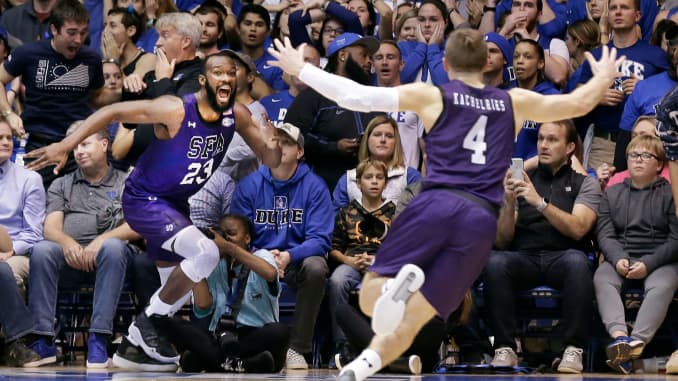When it comes to doing play-by-play chances are pretty good that you’re going to be calling a multitude of sports. Probably on several different levels, NCAA, G-League, Minor League Baseball, MLB, etc. Is there a difference to how you call one or the other? Should you do something different when calling a college game vs. a pro game? The answer isn’t quite as simple as yes or no. It’s kind of like being a parent of two kids, love them both but parent them differently. After all, they are two different organisms. Right?
The same basic principles of play-by-play apply to everything you call. That shouldn’t change. Describe the action accurately, follow the ball, give time and score often and use your voice as an instrument. We’ve covered a lot of that in previous columns. So make sure to understand this foundation will serve you well no matter what level you are announcing.

I’ll talk about College Basketball and G-League hoops from the perspective of a radio broadcaster, but basically the same things apply to television as well.
The college level lends itself to a little more promoting the product, portraying schools as not just athletics but academics as well. It’s also about telling stories about the student athletes. After all, these are 18-year old kids as freshman that become 21-year old men as seniors. Some of these players have amazing backgrounds. More and more they’re coming from foreign countries to play basketball and get an opportunity to get an education as well. I always try to keep in mind that even when a game gets intense and every play is meaningful, these are youngsters learning life lessons. How to handle adversity, how to handle being on top and how to handle the in-betweens.
During college games, I try to picture in my head, who I believe is listening or viewing this broadcast. In most cases to me, its immediate family members, other relatives and close friends. I’m sure there are fans and alums as well out in the audience but they love this school as well as the players, so why change?

Why do I think like this? Because after calling many pro games (MLB, G-League) I have to understand that these are not professional athletes and those close to these players are tuning in to hear/view something good about the one they care about. Listen, I’m not saying sugar coat mistakes. Your audience will know. I’m saying realize who is playing and treat the players and their families with respect.
With that in mind, there are times I take more chances in college games. I may try some new descriptions or new ways of calling a play. I do this to see if it works or not. The opportunity is there for you to experiment a little, but don’t let it affect the actual announcing of the game. Don’t change that, it will only get you in trouble.
Professional games, like in the NBA and the G-League to me require a little more concentration on the game and less on the periphery. Sometimes there are stories of guys getting a look at the NBA level in the developmental league or a player hanging on to a dream and playing for the love of the game. More often than not these are players trying to stick out to catch interest from other NBA teams. The calls are more about command of the game and broadcast than they are of the fluff that may be surrounding a game.
The fact that players are being paid by either their G-League affiliate or NBA team, means to me that this is their job. Criticism, if handled the right way, is somewhat more acceptable in these cases. Players are held much more accountable by way of decreased playing time or being cut. Those are the facts.
Now it can’t be all business all the time. I think it’s about a 70/30 split in the upper ranks. I try to fancy up my basics, if that makes sense. After many reps in these sports, you try to take your “basics” to a higher level each time you crack the mic to broadcast a game. It’s all about getting better no matter the sport or level you’re calling.
When it comes to gathering notes and stats for a broadcast, I find that it’s usually easier to get information from the college teams. To me the most underrated folks around the country are the SID’s (Sports Information Directors) for colleges and universities. Most that I’ve come to know, spend enormous amounts of time on “Game Notes” providing great insight into their teams. They are dialed in with the program and are well versed to answer any questions or concerns a broadcaster may have. They have even been known to arrange interviews with opposing coaches by reaching out to the other team’s SID to set them up. This allows the play-by-play announcer and color analyst a chance to learn some of the nuances of the team they don’t normally cover. This helps to present a more balanced call of the game.

When it comes to calling either college games, pro games or a combination of both always be prepared. That is the one thing that never changes no matter what sport or level you are calling. It’s hard to present a good broadcast when there are gaps in your knowledge of the teams or rules. Most of all, enjoy the games and try and present your best product every time you go on the air.
Andy Masur is a columnist for BSM and works for WGN Radio as an anchor and play-by-play announcer. He also teaches broadcasting at the Illinois Media School. During his career he has called games for the Chicago Cubs, San Diego Padres and Chicago White Sox. He can be found on Twitter @Andy_Masur1 or you can reach him by email at Andy@Andy-Masur.com.





